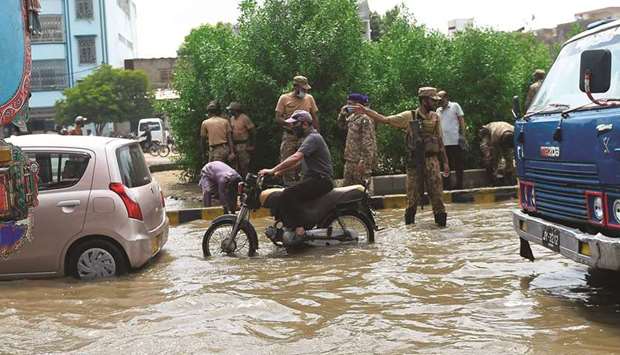Sindh Chief Minister Murad Ali Shah has said that a sum of at least $10bn is required to modernise Karachi’s infrastructure.
“The city’s issues are not new: they have been here for some time. In the past four years, we have worked a lot to clear the storm drains in the city,” he said, noting that a new monsoon spell began on July 26-27, with the heaviest rainfall last recorded in 1977.
“There was a lot of rain back in 2007, when nearly 200 people had died,” he noted.
The Sindh government has been giving funds to the Karachi Metropolitan Corporation (KMC) to clean the nullahs (storm drains) in the city, the chief minister added.
“In the last four years, we cleared many nullahs in the city. Despite the heavy rainfall, water was cleared within three to four hours,” Shah said.
“The major problem is due to a major structure, which has blocked all nullahs in Karachi, which are the responsibility of the cantonments and DMCs (district municipal councils).
“In recent times, the responsibility to clean the storm drains lie with the KMC, and Sindh government has given money to clear the nullahs.”
The spokesperson for the Sindh provincial government, Senator Murtaza Wahab, said that he would much prefer to identify the issues that are plaguing the metropolis, rather than engage in mudslinging.
“Until and unless we all understand the challenges that Karachi faces, they cannot be resolved,” he added.
Responding to the Sindh chief minister’s remarks about the KMC having the responsibility to clear up drains in the city, Karachi Mayor Waseem Akhtar said the city did not fall under the domain of one man.
“One person does not have entire city’s domain,” he said, adding that the issues stemmed from the fact that the powers were not vested with one person.
“Until the local governments are given power, nothing can be done. Clearing nullahs is my responsibility, but I (could) only do so when I have the resources,” he added, stressing that had Article 148 been imposed, the city would not have been facing these issues.
However, the nullahs would not be cleared until the DMCs had funds and resources, he stated, adding that the KMC was short of Rs130mn in salaries.
Meanwhile, as many as 200 families in Karachi’s Surjani Town were forced to evacuate as rains continued to wreak havoc in the metropolis.
Residents of Yousaf Goth, Bismah Town, Sector 4-B and other low-lying areas in Surjani Town had to evacuate due to flooding in the area.
The residents were moved with the help of Rangers and Edhi workers in trucks and boats to safe locations.
Low-lying areas in the city have been the hardest hit with the fifth spell of rain as nullahs overflowed.
In New Karachi’s sector 5-E and the Hyderi Market, rainwater flowed from the storm drains which could not be cleared in due time due to encroachments extending into streets.
The rains were followed by subsequent power outages across the city, with several areas of the metropolis plunged into darkness after nearly 600 K-Electric feeders tripped.
Areas that had experienced power outages included Surjani Town, Orangi Town, North Karachi, New Karachi, Liaquatabad, Jamshed Quarters, FC Area, Khamosh Colony, Gulistan-e-Jauhar, Ahsanabad, Shadman Town, Safoora Goth, FB Area, Power House, and parts of Clifton, among others.
Meteorological Department director Abdul Qayyum Bhutto had said that the city might receive 100mm of rainfall, with some areas receiving heavy or moderate showers.
He had warned that the monsoon spell can last with intermittent rain showers until Wednesday, adding that heavy rains could cause urban flooding once again.
Federal Minister for Planning and Development Asad Umar has meanwhile said that the federal government is committed to resolving the issues faced by the people of Karachi.
Speaking at a function in Karachi, he said that water shortage, sewerage, transport and solid waste management issues faced by the city’s residents will be resolved through co-ordinated effort with the provincial government.
Later, the minister also held a meeting with the Pakistan Tehreek-e-Insaf (PTI) Sindh leadership in Karachi and discussed the city’s issues.
During the meeting, it was agreed that work on development projects in Karachi, the economic hub of the country, is to be expedited.

Pakistani army soldiers take part of rescue operation in a flooded area after heavy monsoon rains in the Pakistan’s port city of Karachi.
